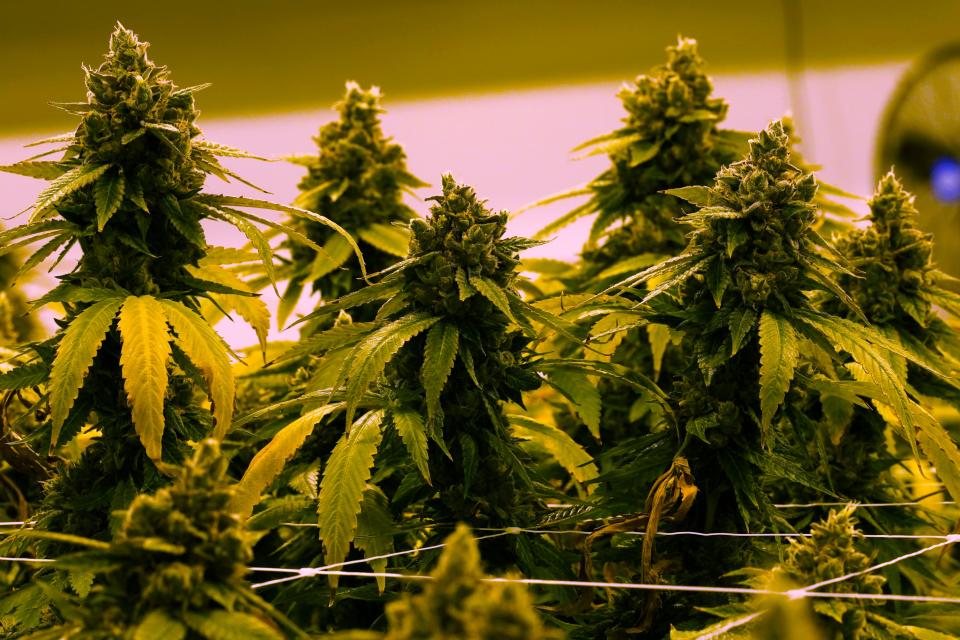Congressman in NC deploys fearmongering to oppose Cherokee recreational marijuana plan
- Oops!Something went wrong.Please try again later.
Once again, Congressman Chuck Edwards decided use his privilege as a middle-class, white man for evil, targeting the Eastern Band of Cherokee Indians for something that truly isn't his business by introducing the “Stop Pot Act,” in direct retaliation to the EBCI's recent vote to legalize recreational marijuana on their reservation.
For those unaware, the EBCI is a sovereign nation Edwards has no control over. Sure, one could argue that the reservation is in his district and thus, could negatively affect his constituents. But if that really were the case, he would have actual salient arguments to make, not a bunch of not-sourced, out-of-context scare tactics, that when correctly interrogated, don’t hold a candle to the economic benefits this could bring — Colorado’s legalization of marijuana saw an increase in tax revenue and no increase in marijuana-related crime — not to mention the fact that according to Pew research, 88% of U.S. adults agree that marijuana should be legal for medical and recreational purposes.
More: Keem Jones: Rain cannot douse vibe at National Cannabis Festival in Washington
On Sept. 15, Edwards posted a graphic to the platform formerly known as Twitter: “A 2023 study from Columbia University found that teens who use marijuana recreationally are two to four times more likely to develop psychiatric disorders such as depression and suicidality than teens who don’t use marijuana.”
Edwards doesn’t cite or link to his source, nor quote directly from it, which is a tactic one entails when trying to create a narrative. I work in marketing. I cite facts, figures and studies daily to try to make audiences think a certain way. I, however, work for an organization that values honesty. If we can’t link to a source or it only works without context, we don’t use it.
More: Troy Williams: I worked as a narcotics officer in Fayetteville. I changed my mind on marijuana.
After some Googling, I found the Columbia study, run by Dr. Ryan Sultan, who, in a May 26 NBC News interview on the subject, said, “Of all the people I’ve diagnosed with a psychotic disorder I can’t think of a single one who wasn’t also positive for cannabis.” That’s called anecdotal evidence. It’s not based on fact but on memory and interpretation. I highly doubt that every single person this man has diagnosed with a psychotic disorder used cannabis. Anecdotally, I know people with psychiatric conditions who don’t use marijuana.

Even more damning, the same interview fact-checks Sultan, writing, “Because research to date has been observational and doesn’t directly prove cause and effect, the connection between marijuana and psychiatric disorders is controversial. … Sultan acknowledges the limitations of the evidence.”
More: Powerful NC senator says smoking marijuana saved his life during chemotherapy for cancer
On Sept. 16, Edwards tweeted, “A 2023 study published in the British Medical Journal showed that using marijuana increased the risk of the start of a psychotic or mental health disorder and using it after the start of a mental condition made clinical outcomes worse.”
The actual study isn’t about “using marijuana” but “cannabis use disorder,” which the CDC defines as being “unable to stop using marijuana.” There’s a marked difference between using marijuana and being addicted to it, the same way there’s a difference between having a glass of wine with dinner and being an alcoholic.
More: The Cherokee Indians are legalizing medical marijuana in NC. Here's what you need to know
Finally, on Sept. 19, Edwards tweeted, “The American Academy of Pediatrics reported that one in six infants and toddlers who were hospitalized for lung inflammation in Colorado tested positive for marijuana exposure.” I bet you’ll be shocked to learn that with context, this stat isn’t as powerful or accurate as presented.
First of all, this was not a study by the well-regarded American Academy of Pediatrics. It was a study “presented at the Pediatric Academic Societies 2016 Meeting,” meaning it wasn’t necessarily peer-reviewed or ever even published. It’s also from 2016, and in my world, best practices are that you don’t cite information more than five years old unless it’s a definitive study, as that information is likely outdated. The sample size from this study also included babies admitted to one Colorado hospital between 2013-2014.

“Our study demonstrates that, as with secondhand tobacco smoke, children can be exposed to the chemicals in marijuana when it is smoked by someone nearby,” Dr. Karen M. Wilson said. Wow. Second-hand smoke — whether that be marijuana or tobacco — is bad? Gee. Thanks, Chuck. I’m sure your forthcoming “Stop Cigarettes Act” will save the children just as powerfully as Lauren Boebert groping a date in public.
An accurate stat Edwards should familiarize himself with? Children in North Carolina are 51% more likely to die from gun violence than the national average.
Pat Brothwell is a former high school teacher, and current writer and marketing professional living and working in Asheville.
This article originally appeared on Asheville Citizen Times: NC Cherokee marijuana plan attacked by buttinsky congressman

